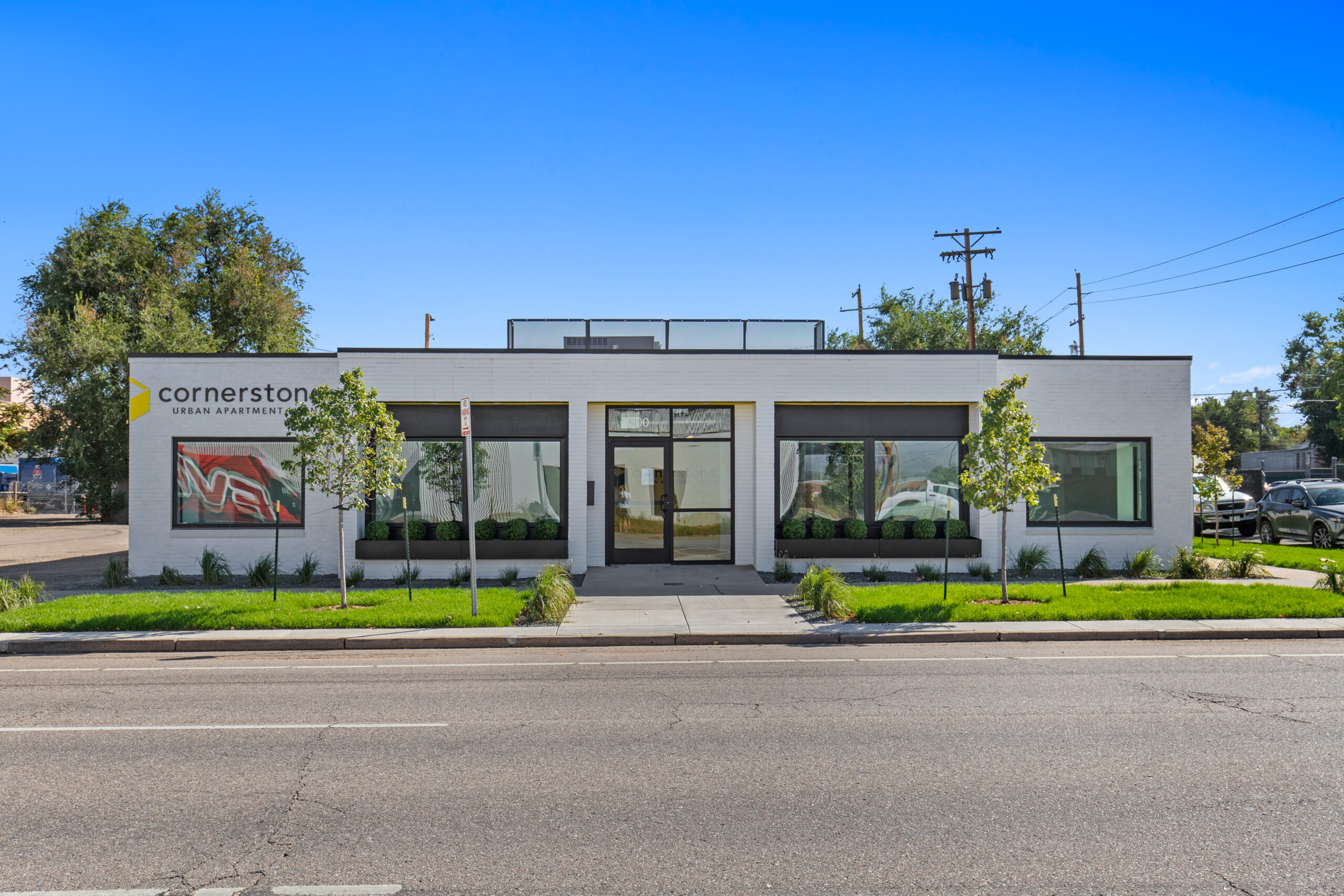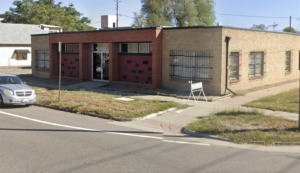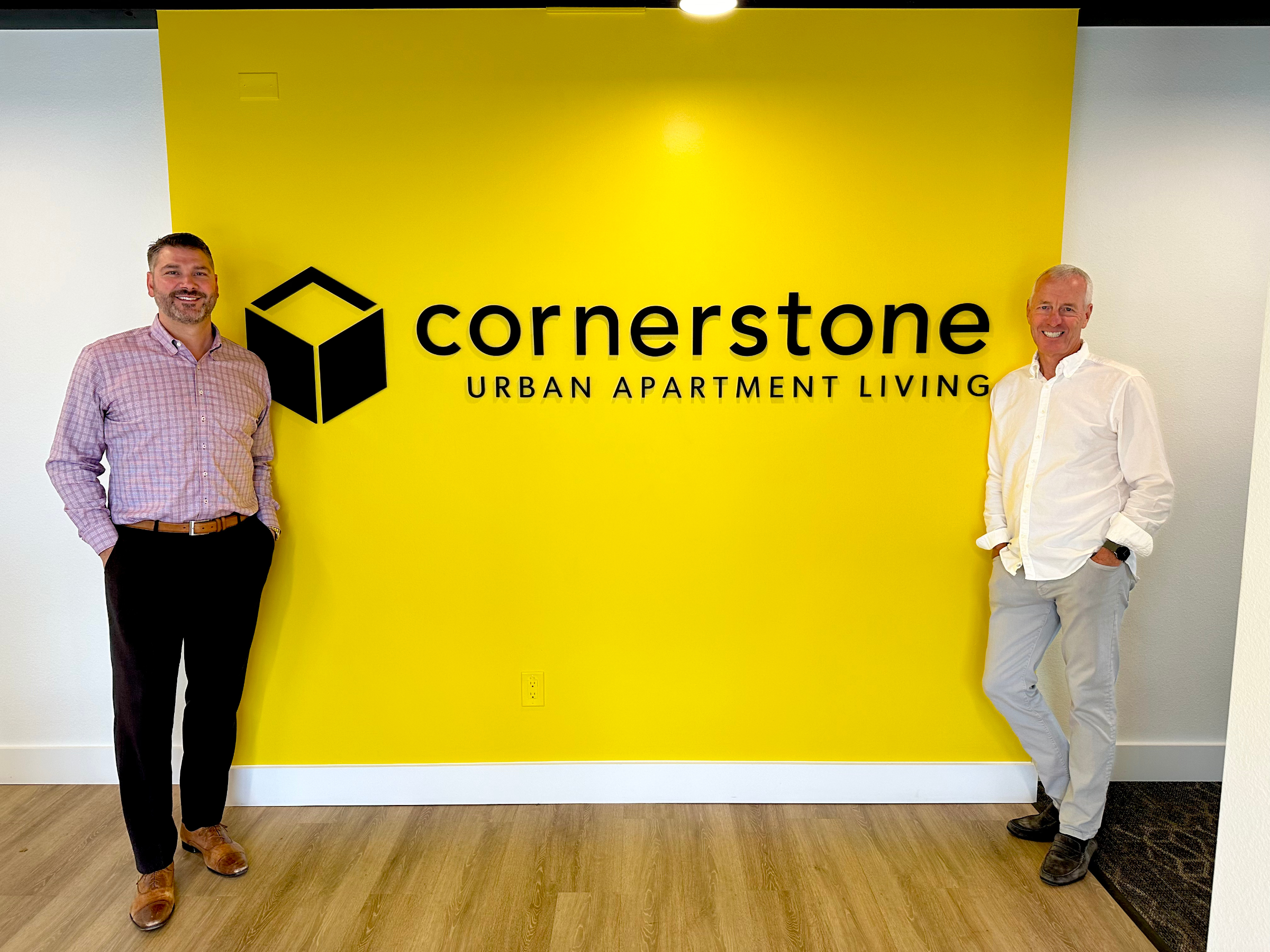
Cornerstone Apartment Services’ new headquarters at 500 Kalamath St. in Baker. (Courtesy Charlie Hogan)
A Denver property-management company has laid down a new cornerstone for its growing urban apartment empire.
“I have more business than I can take on right now coming through the door,” said Charlie Hogan, CEO of Cornerstone Apartment Services.
Over the past few months, the business has moved from a 4,800-square-foot single-story office at 665 Grant St. to its new headquarters at 500 Kalamath St. in Denver’s Baker neighborhood. Hogan said the lease on Grant Street was expiring soon and the new location will help “create the next 10 years of our business.”
The company manages over 7,200 units across more than 275 properties within four miles of the Capitol building downtown. Many buildings are smaller complexes owned by individuals. Cornerstone’s average property has 30 units.
“We’ll take over for the mom-and-pop businesses that just can’t keep up with all the legislative changes that have taken place,” Hogan said.
Cornerstone purchased the 6,000-square-foot Kalamath Street building, along with the house next door, in 2022 for approximately $2.2 million.
Hogan said the plan is to knock down the home and build a 6,000-square-foot addition over the next two years that will include some warehouse space and allow the business to get up to 10,000 units under management. The company, which also renovates buildings for clients, currently rents storage space elsewhere in town for maintenance and construction materials elsewhere in town.
“It’s really to be able to pre-purchase materials, kind of more your day-to-day materials, on top of warehousing … that we can buy bulk to save our clients money and store for them,” Hogan said.

The building as seen in October 2019. (Google Maps)
Cornerstone has already spent around $1 million renovating the existing office building it moved into. It was previously home for decades to a surveying company. Hogan said the structure “was in shambles,” when he made the purchase. The roof was leaking and the drywall was “beat up.”
“But that’s exactly what we do. That’s why we thought it was an opportunity,” he said.
The company started moving its 160 employees from its old office on the southern edge of Cap Hill to Kalamath Street at the beginning of November. The new office with the future expansion will support growth up to around 225 people.
Cornerstone, founded in 1998, breaks down its apartments into smaller, 15-20 building “portfolios” in close geographic proximity to one another. Each portfolio has 300-400 units, and is staffed with a specific maintenance crew. The property-management firm completes approximately 25,000 work orders every year, Hogan said.
“We’ve never solicited a business once, never called anybody to ask and manage their property. It’s all come word-of-mouth via relationships,” Hogan said.

Charlie Hogan, left, stands with Cornerstone founder Jim Lorenzen. (Courtesy Charlie Hogan)
But as the business has grown, so have the number of laws and regulations around apartment buildings — 34 to be exact, per Hogan.
“When I first started 19-and-a-half years ago, Denver in particular was very landlord-friendly … Things that have changed are, you know, longer time for residents to pay rent, which, those things hurt our ability to manage cash flow for the apartment owner. I think we’ve been looked at as the Big Bad Wolf if you own an apartment building, which is not necessarily the case,” he said.
“A lot of my clients are single females, a lot of accountants, CPAs, that depend on this money day-to-day as part of their retirement,” Hogan said.

Cornerstone Apartment Services’ new headquarters at 500 Kalamath St. in Baker. (Courtesy Charlie Hogan)
A Denver property-management company has laid down a new cornerstone for its growing urban apartment empire.
“I have more business than I can take on right now coming through the door,” said Charlie Hogan, CEO of Cornerstone Apartment Services.
Over the past few months, the business has moved from a 4,800-square-foot single-story office at 665 Grant St. to its new headquarters at 500 Kalamath St. in Denver’s Baker neighborhood. Hogan said the lease on Grant Street was expiring soon and the new location will help “create the next 10 years of our business.”
The company manages over 7,200 units across more than 275 properties within four miles of the Capitol building downtown. Many buildings are smaller complexes owned by individuals. Cornerstone’s average property has 30 units.
“We’ll take over for the mom-and-pop businesses that just can’t keep up with all the legislative changes that have taken place,” Hogan said.
Cornerstone purchased the 6,000-square-foot Kalamath Street building, along with the house next door, in 2022 for approximately $2.2 million.
Hogan said the plan is to knock down the home and build a 6,000-square-foot addition over the next two years that will include some warehouse space and allow the business to get up to 10,000 units under management. The company, which also renovates buildings for clients, currently rents storage space elsewhere in town for maintenance and construction materials elsewhere in town.
“It’s really to be able to pre-purchase materials, kind of more your day-to-day materials, on top of warehousing … that we can buy bulk to save our clients money and store for them,” Hogan said.

The building as seen in October 2019. (Google Maps)
Cornerstone has already spent around $1 million renovating the existing office building it moved into. It was previously home for decades to a surveying company. Hogan said the structure “was in shambles,” when he made the purchase. The roof was leaking and the drywall was “beat up.”
“But that’s exactly what we do. That’s why we thought it was an opportunity,” he said.
The company started moving its 160 employees from its old office on the southern edge of Cap Hill to Kalamath Street at the beginning of November. The new office with the future expansion will support growth up to around 225 people.
Cornerstone, founded in 1998, breaks down its apartments into smaller, 15-20 building “portfolios” in close geographic proximity to one another. Each portfolio has 300-400 units, and is staffed with a specific maintenance crew. The property-management firm completes approximately 25,000 work orders every year, Hogan said.
“We’ve never solicited a business once, never called anybody to ask and manage their property. It’s all come word-of-mouth via relationships,” Hogan said.

Charlie Hogan, left, stands with Cornerstone founder Jim Lorenzen. (Courtesy Charlie Hogan)
But as the business has grown, so have the number of laws and regulations around apartment buildings — 34 to be exact, per Hogan.
“When I first started 19-and-a-half years ago, Denver in particular was very landlord-friendly … Things that have changed are, you know, longer time for residents to pay rent, which, those things hurt our ability to manage cash flow for the apartment owner. I think we’ve been looked at as the Big Bad Wolf if you own an apartment building, which is not necessarily the case,” he said.
“A lot of my clients are single females, a lot of accountants, CPAs, that depend on this money day-to-day as part of their retirement,” Hogan said.


